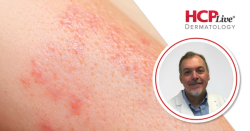
OR WAIT null SECS
FDA Approves Abrocitinib for Moderate to Severe Atopic Dermatitis in Adult Patients
The decision was supported by 5 clinical trials that resulted in significant improvements in skin clearance, extent of disease, and severity.
Pfizer Incorporated announced that the US Food and Drug Administration (FDA) approved abrocitinib (CIBINQO) for the treatment of adults with refractory moderate-to-severe atopic dermatitis whose disease is not adequately controlled with other systemic drugs including biologics.
Abrocitnib is an oral, once-daily, Janus kinase 1 (JAK1) inhibitor with the recommended doses of 100 mg and 200 mg, the latter of which is recommended for patients who do not respond to the 100 mg dose.
A 50 mg dose was also approved to treat moderate-to-severe atopic dermatitis in patients with moderate renal impairment in addition to certain patients receiving treatment with inhibitors of cytochrome P450 (CYP) 2C19, or patients who are known or suspected to be poor metabolizers of CYP2C19.
A dose of 100 mg of abrocitinib was recommended for patients with moderate renal impairment who do not respond to 50 mg once daily.
The approval was supported by results of 5 clinical trials from a large-scale program which included more than 1600 patients. The efficacy and safety of the biologic was evaluated through a randomized, placebo-controlled, dose-ranging trial and an ongoing long-term open-label extension trial.
In all trials, abrocitinib demonstrated a consistent safety profile and significant improvements in skin clearance, extent of disease, and severity, as well as rapid improvement in itch after 2 weeks compared to placebo.
A higher proportion of subjects treated with the biologic in 2 monotherapy trials achieved improvement in itching at week 12 compared to placebo, and common adverse events reported in ≥5% of patients included nasopharyngitis (12.4% with abrocitinib 100 mg, 8.7% with 200 mg, and 7.9%, with placebo), nausea (6%, 14.5%, and 2.1%, respectively), and headache (6%, 7.8%, and 3.5%, respectively).
“The reality for patients living with chronic inflammatory skin disease such as moderate-to-severe atopic dermatitis is that many experience debilitating symptoms that are not managed by current treatment options,” said Jonathan Silverberg, MD, PhD, MPH, Department of Dermatology, The George Washington University School of Medicine and Health Sciences. “Today’s approval of CIBINQO will provide an important new oral option that could help those who have yet to find relief.”


